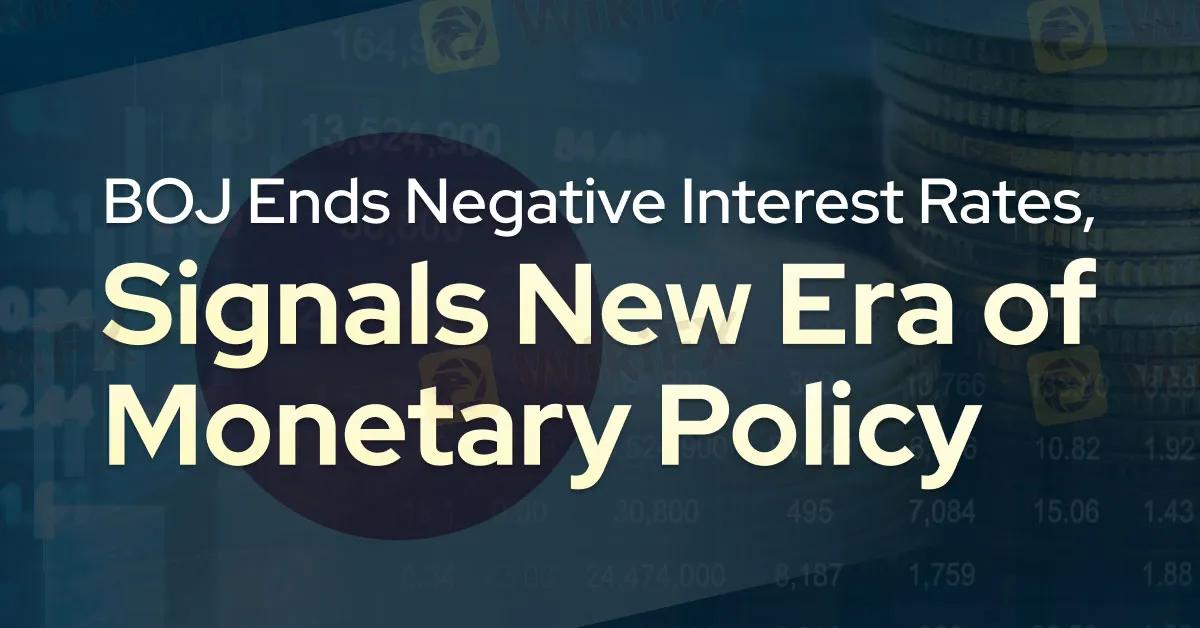简体中文
繁體中文
English
Pусский
日本語
ภาษาไทย
Tiếng Việt
Bahasa Indonesia
Español
हिन्दी
Filippiiniläinen
Français
Deutsch
Português
Türkçe
한국어
العربية
BOJ Ends Negative Interest Rates, Signals New Era of Monetary Policy
Abstract:The Bank of Japan (BOJ) announced a pivotal shift in monetary policy, ending its eight-year practice of negative interest rates and signalling Japan's first interest rate hike in nearly two decades, amidst a cautious approach to economic recovery and global monetary trends, impacting investor sentiment and currency dynamics.

The Bank of Japan (BOJ) declared a significant policy shift on Tuesday, announcing the cessation of its eight-year practice of implementing negative interest rates and winding down its extraordinary measures designed to stimulate economic growth. This change represents Japan's first interest rate hike in nearly two decades, reflecting a cautious approach to monetary policy amid a gradual economic recovery.
BOJ's decision places Japan as the last major central bank to depart from negative interest rates, marking the end of a global trend where economies benefited from low-cost capital and innovative financial strategies.
During a post-decision press briefing, BOJ Governor Kazuo Ueda explained that the bank is transitioning back to a standard monetary policy focusing on short-term interest rates, aligning with the practices of other central banks. Ueda also hinted at the possibility of further adjustments to interest rates if inflation trends upwards, refraining from specifying the timing or extent of potential rate hikes.

In a widely anticipated move, the BOJ abandoned a policy introduced in 2016 under former Governor Haruhiko Kuroda, which imposed a 0.1% fee on certain surplus reserves held by banks with the central bank. Instead, the BOJ has now designated the overnight call rate as its primary policy rate, maintaining it within a range of 0-0.1%, partially achieved by offering 0.1% interest on central bank deposits.
Frederic Neumann, HSBCs chief Asia economist, noted that the BOJ's departure from negative interest rates marks the beginning of its normalization of monetary policy, indicating the bank's confidence in Japan's transition away from deflationary pressures.
The central bank also abandoned its yield curve control (YCC) strategy, which had kept long-term interest rates close to zero since 2016, and ceased its purchases of high-risk assets.
Despite these changes, the BOJ intends to continue purchasing substantial amounts of government bonds and is prepared to increase these purchases should bond yields rise sharply, signalling its commitment to preventing a sudden spike in borrowing costs. The central bank's statement emphasized its intention to maintain “accommodative financial conditions” for the foreseeable future.
Following the announcement, Japanese stock prices rose, while the yen weakened against the dollar, with investors interpreting the BOJ's cautious stance as suggesting that the interest rate differential between Japan and the United States would remain significant.

Disclaimer:
The views in this article only represent the author's personal views, and do not constitute investment advice on this platform. This platform does not guarantee the accuracy, completeness and timeliness of the information in the article, and will not be liable for any loss caused by the use of or reliance on the information in the article.
Read more

The Ultimate Guide to Automated Forex Trading in 2025
Modern markets are revolutionized by automated trading systems, which now execute 70-85% of all transactions. These advanced automated trading software solutions, commonly called trading robots or Expert Advisors (EAs), leverage algorithmic precision for automatic trading across forex, stocks, and commodities 24/7. By removing emotional interference and executing trades in microseconds, auto forex trading platforms create fair opportunities for all market participants. For those new to automated trading for beginners, these systems provide disciplined, backtested strategies while significantly reducing manual effort.

Will natural disasters have an impact on the forex market?
The forex market is known for its rapid responses to global events, but the influence of natural disasters, such as earthquakes and typhoons, can be less straightforward. While headlines may scream about catastrophic damage and economic disruption, the long-term effects on currency values often depend on a blend of immediate shock and underlying economic fundamentals.

Philippines Deports 29 Indonesians Linked to Online Scam Syndicate in Manila
Online scam groups in the Philippines trick Filipinos into gambling and love scams, from Manila to Bacolod, causing trafficking and pain as police fight back.

Why does your mood hinder you from getting the maximum return from an investment?
Investment decisions are rarely made in a vacuum. Aside from the objective data and market trends, our emotions—and our overall mood—play a crucial role in shaping our financial outcomes. Whether you’re feeling overconfident after a win or anxious after a loss, these emotional states can skew your decision-making process, ultimately affecting your investment returns.
WikiFX Broker
Latest News
How Crypto Trading Transforms FX and CFD Brokerage Industry
UK would not hesitate to retaliate against US tariffs - No 10 sources
FCA Warns Against 10 Unlicensed or Clone Firms
CySEC Warns Against 14 Unlicensed Investment Websites
Top Currency Pairs to Watch for Profit This Week - March 31, 2025
Will natural disasters have an impact on the forex market?
Philippines Deports 29 Indonesians Linked to Online Scam Syndicate in Manila
Navigating the Intersection of Forex Markets, AI Technology, and Fintech
Exposed: Deceptive World of Fake Trading Gurus – Don’t Get Fooled!
AI-Powered Strategies to Improve Profits in Forex Trading
Currency Calculator








